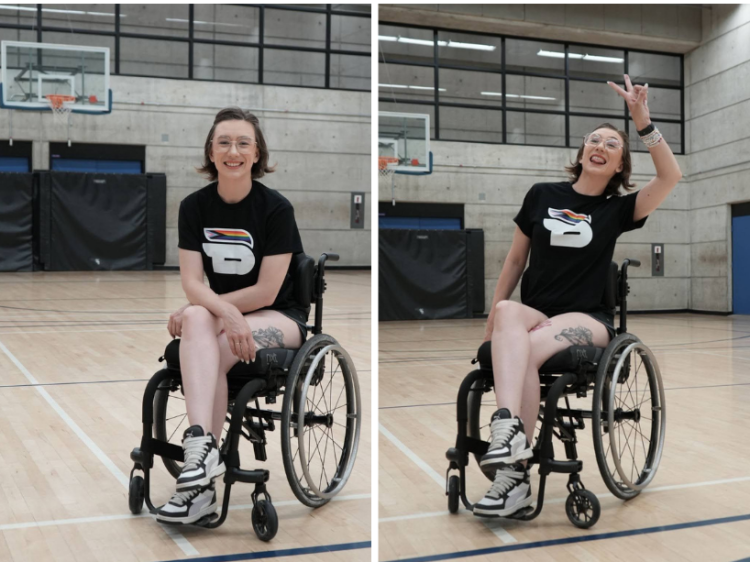Sierra Lefave never imagined she would one day become the community and equity outreach lead for the disability community at Toronto Metropolitan University's Recreation and Athletic Centre (RAC).
"If you told me in 2021, as a disabled girl who's always last picked in class, always hated gym, always bad at sports, that I would work for the recreation department, I would have told you you were crazy," said Lefave.

Sierra Lefave, TMU's first community and equity outreach lead for the disability community, is working to make the RAC a space where every student feels welcome. (Photo: Ruchi Srivastava, 4th year student in Media Production)
Her path to TMU began when she returned to school as a mature student.
In addition to navigating the challenges of re-entering academic life, Lefave lives with a rare disability that requires her to maintain daily physical activity to preserve her mobility.
From hesitation to leadership
Initially, Lefave was hesitant to use the university's athletic spaces.
But, after voicing her concerns to peers, she was encouraged to reach out directly to the RAC team.
That moment marked the beginning of a transformative journey.
Her conversations quickly evolved into deeper discussions about accessibility and inclusion.
Lefave began identifying barriers she faced and realized others likely shared the same experiences. That insight led to her transition into the newly created role of equity and outreach lead for the disability community, which she officially began in January 2025.
In this position, Lefave listens to the community, identifies problems within the RAC space and collaborates with the team to implement adaptive and inclusive solutions.
Making fitness accessible for everyone
Since stepping into the role, Lefave has led several key initiatives.
One priority is making fitness classes more accessible by advocating for adaptive fitness classes, where instructors are trained to automatically offer modified versions of movements, without singling anyone out.
"They're just going to adapt the workout on the spot so you're not going to feel called out or on the spot because you're doing the same movements they're just modified," said Lefave.
She also shared that discussions are underway to make TMU one of the first Toronto universities to offer parasports.
The power of visibility
Lefave understands how powerful visibility can be, which is why she's teamed up with the RAC to produce social media content showing that athletic spaces can be welcoming and inclusive.
"I wanted to help younger disabled students on campus and off of campus," said Lefave.
She hopes that when other people see her online emphasizing that the RAC is a welcoming space for everyone, that it will encourage more students with disabilities to participate and feel seen in athletic spaces.
Bringing her whole self to the work
Outside of her job with the RAC, Lefave also serves as the president of the Disability Student Council (DSC).
The DSC is currently working with the RAC to explore programs focused on disability wellness, including safe and supportive spaces for students with disabilities to connect and come together.
In addition to her advocacy as a disabled student, Lefave identifies as Indigenous.
She emphasized the intersections between Indigeneity and athletics, noting that physical activity is deeply rooted in Indigenous wellness teachings.
Looking ahead
While Lefave recognizes there are no quick and simple solutions and systematic change takes time, she remains optimistic.
"Within recreation there is no score. There is no end goal. Nobody needs to win the game. It's about getting fit. It's about moving your body. It's about being healthy and getting your blood pumping and having fun," said Lefave. "At the end of the day everybody is actually capable of those things."
Find out more about TMU Recreation and active well-being programs.










